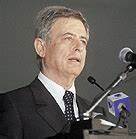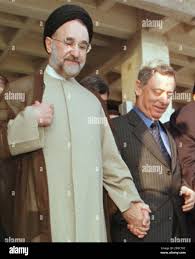Syrian Vice President Abdul-Halim Khaddam stated that Israel raised the issue of implementing the conditional Resolution 425 with Israeli demands. It was pre-known that Lebanon could not accept its conditions, and this rejection was one of Israel’s objectives in an attempt to improve its tarnished image in the global public opinion.
Khaddam spoke yesterday about the regional and international situations at a meeting organized by the Qatari leadership of the Arab Socialist Ba’ath Party for the secretaries of party branches and governors in Damascus. This semi-regular meeting constitutes one of the most important domestic political activities attended by leaders in the party and the state, heads of popular organizations, unions, and media institutions. It addresses internal, Arab, regional, and international issues.
Participants listened to Khaddam discussing Arab, regional, and international issues, giving prominence in his presentation to the Lebanon issue and the deceptive Israeli proposal that links the implementation of Resolution 425 with a series of conditions affecting Lebanon’s sovereignty and distorting the resolution’s spirit and text.
Khaddam said that when the Security Council adopted Resolution 425, it addressed the issue of peace between Lebanon and Israel. Consequently, it requested Israel’s immediate withdrawal beyond the international borders without putting any conditions on Lebanon. Israel was ordered to withdraw immediately. When Israel proposed the conditional implementation, it knew in advance that Lebanon could not accept its conditions. This was one of its objectives in attempting to improve its black image in the global public opinion at a time when the peaceful process is stalled, and the Palestine Liberation Organization is being blackmailed in Gaza. He added that Israeli conditions turn Resolution 425 into something else. It linked the withdrawal to guarantees and security arrangements. These conditions are not mentioned in the resolution, and everything related to security is linked to comprehensive peace. Israel linked the acceptance of the resolution to incorporating its agents into the structure of the Lebanese state, especially in the army, undermining Lebanon’s sovereignty. Khaddam wondered, has such a thing happened in history? Is it true that Israel wants to withdraw by implementing Resolution 425?
Khaddam considered that security, which Israel demands, is a key element of peace. Can the aggressor ask the aggrieved for security guarantees and arrangements while a state of war persists? He pointed to the Israeli government’s rejection of adhering to the peaceful process according to the Madrid reference. Israel suspended negotiations and disclaimed the commitments of the previous government during the stalled negotiations. He questioned whether, if Israelis want peace, it can be achieved while occupying the land and refusing to recognize Arab rights. Can peace be achieved amid expansionist, Judaization, and displacement policies? He said that the only way to ensure Israel’s desire for peace is for it to accept the resumption of negotiations from where they left off and accept the commitments of the previous Israeli government. Then the region can witness a new phase under fair and comprehensive peace.
Khaddam called for working to establish rules to improve the Arab relations climate and transition from the current situation to a state of Arab partnership to confront the requirements of growth, progress, and external pressures and ambitions.
He presented the crisis between Iraq and the United States and Syria’s stance, emphasizing the need to adhere to Iraq’s unity and territorial integrity and reject any use of force against Iraq or any other Arab country. Khaddam stated that sticking to principles and national constants is the national fortress in facing dangers threatening the Arab nation.
Kuwaiti National Assembly President Ahmed Abdulaziz Al-Saadoun, at the end of his three-day visit to Damascus, announced that he heard from President Hafez al-Assad a detailed explanation and accurate assessment of the current situation in the Arab region, especially regarding the stalled peace process due to Israeli obstinacy. Assad reaffirmed Syria’s steadfast and clear position on all Arab issues, especially the recent Israeli proposal regarding the withdrawal from Lebanon. He added that Syria welcomes the implementation of international resolutions, especially Resolution 425. Still, without Israeli conditions, implementing these resolutions should lead to Israeli withdrawal from all occupied Arab territories.
Al-Saadoun stated that they presented the Kuwaiti situation and the necessity for Iraq to implement all United Nations resolutions from their side. Regarding Kuwait’s stance on the Israeli proposal for the conditional implementation of Resolution 425, Al-Saadoun affirmed that the foundations of Resolution 425 are clear and specific. It demands Israel’s immediate withdrawal from southern Lebanon without conditions.
He pointed out that the recent Israeli proposal for withdrawal from southern Lebanon with conditions cannot be accepted by Lebanon, Syria, or the Arab nation. He confirmed that the only condition the Arab nation can accept is the Israeli withdrawal without conditions.
General Mustafa Tlass also addressed the same topic in a lecture he gave in the city of Sanamein in Daraa Governorate. He exposed the Israeli maneuver by restricting the implementation of Resolution 425 with rejected Israeli conditions. Tlass stated that Lebanon realized the goals of this maneuver, declaring its adherence to the Syrian and Lebanese paths. He said that Israel targets the entire Arab nation, and Syria, with its armed forces and internal front, stands as a solid fortress behind President Hafez al-Assad and is ready to make all necessary sacrifices to defend the dignity and honor of the Arab nation.


